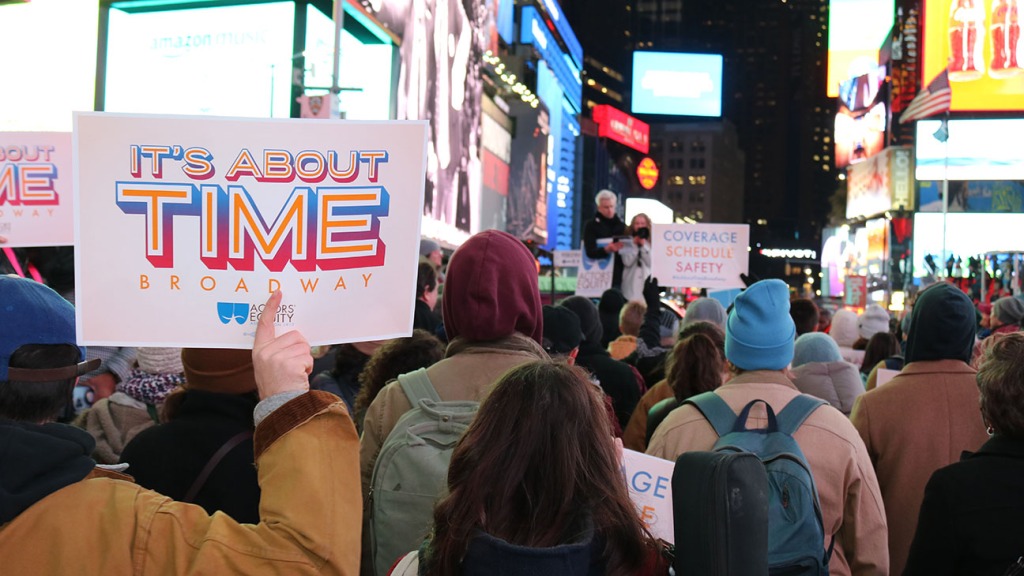
Members of Actors’ Equity voted to approve the new three-year collective bargaining agreement for Broadway shows and sit-down productions.
The union listed achievements in the contract including minimum salary increases in each year of the three-year agreement, better paid sick leave benefits, a decrease in weekly rehearsal hours after a show opens and one additional personal day off for everyone, as well as two fewer 10 out of 12 rehearsals (a practice that occurs the week before opening in which actors and stage managers are scheduled for 10 hours of work and two hours of break time in a day).
However, leadership acknowledged that the contract wasn’t exactly where union members had wanted it to be. In an email sent to members, Actors’ Equity said 57 percent of members voted to ratify the deal. The election saw 42 percent participation among eligible voting members (actors and stage managers who had recently worked on these contracts), according to communications sent to members.
“The Broadway League is the largest group of employers for Equity members, and coming to our first agreement after the pandemic shutdown and subsequent reopening is a major step,” said Equity Executive Director Al Vincent, Jr., who was the lead negotiator. “This was not an easy negotiation, and over 21 bargaining sessions everyone on both sides of the table had to make difficult choices. I am proud of the work the Equity team did to achieve a contract that makes significant strides on a number of issues that have been on our agenda for decades. And this agreement also lays important foundations that we will build on in negotiations to come.”
“We went into this negotiation with an ambitious package reflecting the priorities of actors and stage managers working this contract,” said Kate Shindle, president of Actors’ Equity Association. “While we certainly didn’t achieve all of them, we did make progress: fewer 10/12s, fewer rehearsal hours after opening, significant EDI advances, paid sick leave for the entire Equity company, more stage manager preproduction, increases in some chorus increments and our highest overall salary gains in decades.
“We will need to continue to build on this work. (For example, while we achieved our first-ever cap on split tracks for swings, five is still too many.) I hope our members will stay engaged, especially if they are asked to do anything that makes them feel unsafe. We are now prepping for bargaining both Touring and LORT, which have significant worker overlap with Production. The voices of mobilized actors and stage managers clearly made this a better deal than it otherwise would have been. That same activism and solidarity will also be crucial for these upcoming negotiations,” Shindle continued.
Actors’ Equity and the Broadway League have been negotiating the contract since September. The new agreement will be in effect through September 28, 2025.
The decision came after actors and stage managers had been publicly voicing concerns about work-life balance in the industry, as well as the need for more understudies and standbys Broadway shows and more support for those who are already doing the job.
During the voting period, many actors expressed their discontent with the agreement on social media and said they planned to vote no. The concerns raised included the addition of a new “short-term actor” provision, which allows for an actor to be hired for less than a week of performances, unlike the existing position of a vacation swing, as well as provisions which still allow for a swing to cover up to five parts, as Shindle alluded to.
Dani Spieler, who is currently working as a vacation swing in Chicago and had previously posted about voting no on the contract, said she was “very disappointed” with the results of the vote, as she feels the language in the contract does not address the needs of swings.
“Since reopening, everyone has been saying how above and beyond the swings and understudies have gone by performing multiple roles at a time or going on in a moment’s notice for a track they don’t cover. I was hopeful the support would be there to make significant change in providing adequate coverage and a safe work environment, which have been issues since long before the pandemic. No one person should have to do the job of [four] people,” Spieler wrote in an email to THR.
This came after Actors’ Equity had held a rally in Times Square in which members campaigned for more coverage on Broadway shows, in terms of the number of understudies and greater compensation for those understudies and swings, as well greater paid sick leave. Members also spoke up about better scheduling, including a reduction in back-to-back shows around the holidays and limits on 10 out of 12 technical rehearsals. Maria Briggs, who spoke at the rally, also told THR Monday that while the contract had “gains and flaws” it did not contain the changes she was looking for.

